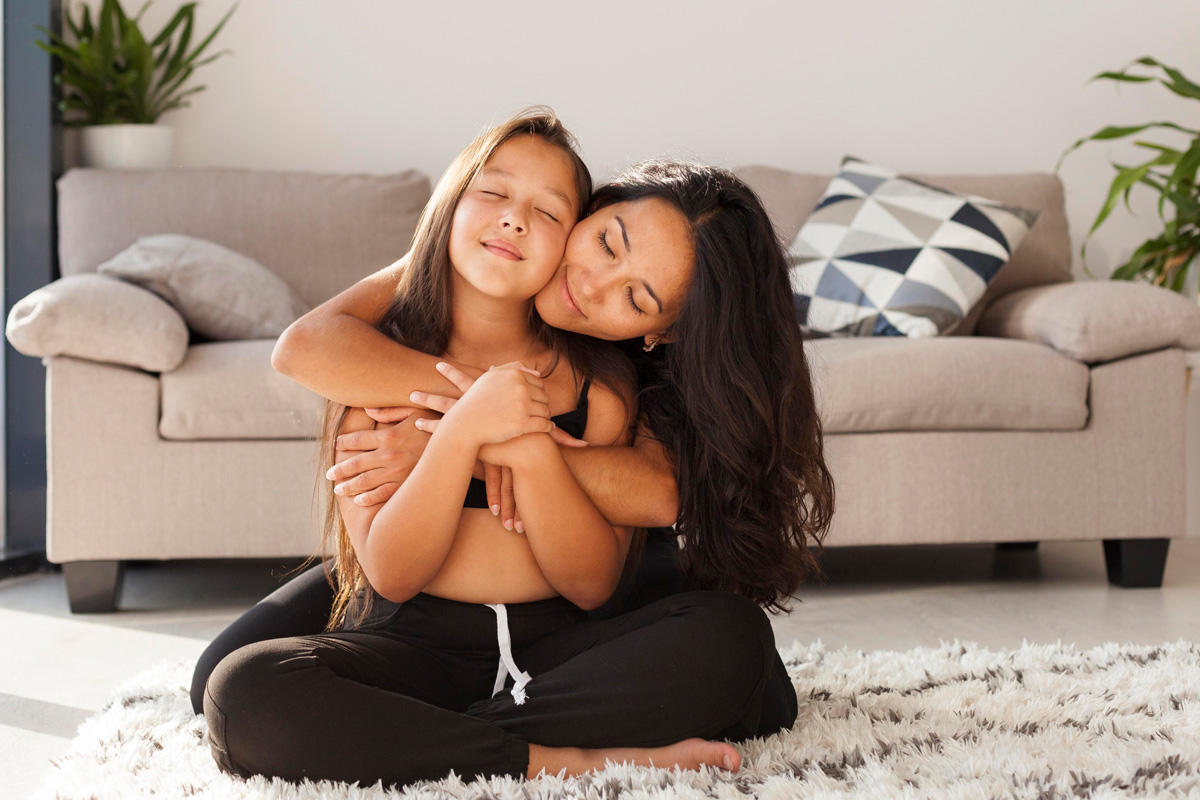Parenting is undeniably one of life’s most rewarding experiences, yet it poses numerous challenges, especially for parents struggling with anxiety. Concerns about your child’s safety, academics, and social interactions can overshadow moments of joy. While anxiety disorders are common, with one out of 3 adults experiencing an anxiety disorder in their lifetime (National Institute of Mental Health, n.d.), resources for managing parental anxiety are limited. However, with the appropriate strategies and support, navigating parenthood with confidence is achievable. Here are 8 strategies and interventions, from us here at The Bain Health and Wellness Center and supported by research, that have helped navigate parenting as anxious parents:
1. Educate Yourself
Knowledge is power, particularly when it comes to understanding anxiety. Take the time to educate yourself about anxiety disorders, including their causes, symptoms, and treatments. Symptoms of anxiety may include excessive worries, physiological symptoms (e.g., shaking, headaches, muscle tension, stomachaches, etc.), poor concentration, and sleep disturbances. It is important to understand how you personally experience your anxiety as it tends to present itself differently from one person to another. It’s okay to feel anxious about your child’s well-being and future – it’s a natural part of being a parent. Yet, when it becomes difficult to manage those worries, and those anxiety symptoms are impacting your daily life and ability to parent, it can be helpful to take the next step and familiarize yourself with evidence-based strategies and seek some help.
2. Focus on What You Can Control as Anxious Parents and Practice Self-Compassion

Anxiety often stems from feeling out of control. As a parent, it’s essential to focus on what you can control and let go of the rest. Encourage your child to view challenges as opportunities for growth and learning. Emphasize the importance of resilience, adaptability, and perseverance in overcoming obstacles and achieving their goals. Set realistic expectations for yourself and your child, and prioritize self-care activities that help reduce stress and promote well-being. Remember that it’s okay to ask for help and delegate tasks. Practice self-compassion by reminding yourself that you’re doing the best you can with the resources and support available to you. Treat yourself with the same kindness and understanding you would offer your child or a friend in a similar situation.
3. Practice Mindfulness and Self-Care for Anxious Parents
Mindfulness techniques can be powerful tools for managing anxiety and stress. Incorporate mindfulness practices into your daily routine, such as deep breathing exercises, meditation, or yoga. These practices can help you stay present in the moment, reduce rumination on anxious thoughts, and cultivate a sense of calm and clarity. Parental self-care is also essential for maintaining physical health, reducing stress, and fostering emotional well-being. It allows you to recharge, manage challenges with patience, and model healthy habits for your children.
4. Cognitive Behavioral Therapy for Anxious Parents
Cognitive Behavioral Therapy (CBT) is a powerful intervention for coping with anxiety, applicable to both children and adults. Through CBT, parents learn to recognize and challenge negative thought patterns fueling their anxiety. By breaking these patterns, they gain control over their emotions and reactions. CBT equips parents with practical tools such as identifying anxious thoughts and reframing them with more helpful or realistic ones. It also helps identify behaviors contributing to more or fewer anxious thoughts. Moreover, it fosters resilience, enabling parents to navigate challenges with confidence and learn tools to manage their anxiety.
5. Practice Exposure Therapy Gradually
Exposure Therapy is an effective therapeutic approach for treating anxiety. This evidence-based form of Cognitive Behavioral Therapy (CBT) aims to help gradually expose individuals to feared situations or stimuli in a controlled manner. If you or your child experiences anxiety, you can work with a therapist to develop a personalized exposure hierarchy tailored to their specific anxiety triggers. Start with less anxiety-provoking situations and gradually progress to more challenging ones as you build confidence and coping skills. These exposures may be anxiety-provoking for parents as well as for children. Yet, exposure is a vital step towards desensitizing a person to anxiety-provoking situations and, more importantly, building confidence over time.

6. Parent-Based Treatment of Childhood Anxiety
In addition to CBT, other evidence-based treatments, such as Supportive Parenting for Anxious Childhood Emotions (SPACE), are available. The parent-based treatment focuses on working with the parents (without the child) on strategies and tools to help their child overcome challenges, such as anxiety and OCD. This is an effective treatment for parents who are anxious themselves and want to learn parent strategies, for anxious children who are too anxious to participate in sessions, and for parents who want to learn skills and tools to help their child overcome anxiety, OCD, or related problems.
7. Lead by Example
Children are keen observers and tend to model the behavior of their caregivers. They are more likely to imitate what you do than to follow what you say. So, it is important to be mindful of how you manage your own anxiety in front of your child. Model healthy coping strategies such as deep breathing exercises, mindfulness techniques, and positive self-talk. Demonstrate resilience in the face of challenges and openly discuss how you navigate your own anxiety in a constructive manner. It can be very powerful for a child to see their parents identify and cope with their own anxiety. Moreover, showing children that it’s okay to experience anxiety and that there are effective ways to cope with it can help reduce the stigma surrounding mental health challenges.
8. Seek Professional Support
Parenting when you have anxiety yourself can be daunting, but it’s important to remember that you’re not alone. By implementing evidence-based strategies and seeking professional support from a qualified mental health professional who specializes in treating anxiety disorders, you can obtain the guidance you need to thrive as a parent and as a person.
Get Parenting Support as Anxious Parents in Arlington, MA Today!
If you believe you are an anxious parent (with a child with or without anxiety) and could benefit from some support, it’s essential to find a therapist experienced to work with you. Look no further than The Bain Health and Wellness Center in Arlington, MA. Our team of experienced therapists understands the challenges you as an anxious parent face and we are here to help you navigate your anxiety. Take the first step towards a calmer, more confident parenting journey by following the steps below:
- Reach out today for a free 20-minute consultation.
- Speak with a compassionate anxiety therapist.
- Find peace of mind to live a more balanced life as a parent!
Other Therapy Services Offered at The Bain Health and Wellness Center
At the Bain Health and Wellness Center (BainHWC), we have therapists who have extensive experience working with individuals with anxiety and have expertise in parenting. We offer in-person and virtual therapy for parents and children with anxiety, OCD, ADHD, depression, trauma, autism, and more. All mental health therapists at BainHWC are trained in evidence-based treatment, such as CBT and SPACE, and have several years of experience working with children, teens, and young adults. We would be happy to discuss what you are looking for and make recommendations on ways to proceed to help your child, you, and your family live a happier life.
Reference:
National Institute of Mental Health. (n.d.). Prevalence of Any Anxiety Disorder Among Adults. Retrieved from https://www.nimh.nih.gov/health/statistics/any-anxiety-disorder#:~:text=Prevalence%20of%20Any%20Anxiety%20Disorder%20Among%20Adults,-Based%20on%20diagnostic&text=An%20estimated%2031.1%25%20of%20U.S.,some%20time%20in%20their%20lives.







